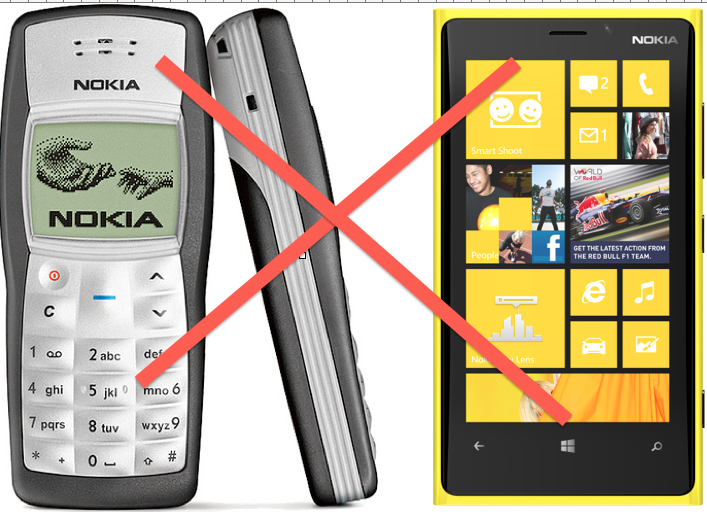A full story behind Nokia's sale to Microsoft
 The Nokia of old is dead! Last year I predicted that this
year would mark the demise of Nokia, at one time the biggest cell phone
manufacturer in the world. After its disastrous dithering and the resulting
market failure Nokia was snatched up by Microsoft for a measly $7.2b, a
fraction of its worth from just a couple of years ago (in comparison, Skype was
bought for $8.6b). However, I do not think that Microsoft really wanted to buy
Nokia, rather it was forced into this move by Nokia’s dismal performance, and
the fact that Nokia carried 90 per cent of all Windows Phone sales. Microsoft
had no choice but to purchase the flailing smartphone maker in order to save
its position in the market.
The Nokia of old is dead! Last year I predicted that this
year would mark the demise of Nokia, at one time the biggest cell phone
manufacturer in the world. After its disastrous dithering and the resulting
market failure Nokia was snatched up by Microsoft for a measly $7.2b, a
fraction of its worth from just a couple of years ago (in comparison, Skype was
bought for $8.6b). However, I do not think that Microsoft really wanted to buy
Nokia, rather it was forced into this move by Nokia’s dismal performance, and
the fact that Nokia carried 90 per cent of all Windows Phone sales. Microsoft
had no choice but to purchase the flailing smartphone maker in order to save
its position in the market.
There are several theories about the reasons for Nokia’s speedy demise;
Partnering with
Microsoft
Nokia was destroyed by its (mis)marriage to Microsoft and
its flailing Windows Phone OS, a process
speeded up by its CEO Stephen Elop and his famous ‘burning memo’ in which he
prematurely sentenced Symbian to death. This only seems correct on the surface;
the Board decided to look for an alternative to its aging (and a market dud) Symbian
operating system while pulling the rug under MeeGo and Maemo, two operating
systems still in development. It was obvious that Nokia’s own Board did not
have any confidence in the company’s ability to develop a worthy competitor to
iOS and Android. A nascent Windows Phone seemed like a good idea.
Failing to adopt
Android
Just because Samsung has succeeded in this it does not mean
Nokia would, there are score of other manufactures that do not make any money
selling Android based devices even if their products are wrapped in a really
nice packaging and loaded with advanced hardware (HTC One for example). Samsung
could have pulled this off due to the economy of scale and its financial might
which stems from its other divisions, from consumer electronics to ships. Samsung
is also a fast follower and it doesn’t really need to innovate; Google is doing
it for them.
Had Nokia adopted Android early as Samsung has, and
innovated quickly with the hardware, price segmentation, etc., than yes, Nokia’s
brand and history would have kept them either ahead of Samsung or at least a
still major player.
The question though, is could they have been competitive with
Samsung when manufacturing becomes the main differentiator. I don't think so.
Nokia created the market. Nokia always led the innovation. Samsung always had to follow. That enabled Nokia to operate with decent margins. But in the new Android world where Google does the innovation in software it's not clear at all that Nokia would be a better competitor than Samsung.
Nokia created the market. Nokia always led the innovation. Samsung always had to follow. That enabled Nokia to operate with decent margins. But in the new Android world where Google does the innovation in software it's not clear at all that Nokia would be a better competitor than Samsung.
Under that scenario, Nokia would have kept its work on Maemo
and MeeGo (which it executed way too slowly and way too poorly). Adding Android
to that mix would not have been a recipe for dominance of the Android market.
The Nokia Board clearly lost confidence in Symbian/Qt/MeeGo
strategy before they decided to go with Microsoft.
Software is a lot harder than people give credit for. If
your company wasn't really great at it already, you aren't going to become
great at it over night. And you can't hire Chinese cloners and use commodity
parts like you can for hardware.
Just look at the Android "skins" (HTC Sense for
example). None of them are better or more efficient than the bare Android. The
customers are annoyed by all of them
– they take away from the user experience factor.
And that's just having to develop a "skin" with
the rest of the Android ecosystem coming along for the ride. Trying to build it
ALL from scratch AND put together an entire ecosystem is simply beyond the top
3 players.
But even the others managed to pull off a good operating
system and managed to pull it off quickly (i.e. MeeGo, Tizen, Firefox...) you'd
still have the ecosystem problem. It's not just about having a great OS, but an
integrated set of services and apps, music, movies, and TV.
But even then they would still have to compete with against
Apple and Google.
Unlike Nokia, Samsung has the resources but not the talent
(yet). And as master of Android, Samsung doesn't have the incentive.
But, while Samsung's unit share dominance is safe it's
profits are not. Samsung will have the fate of the PC manufacturers. Even by
remaining the most profitable non-Apple
manufacturer, it's margins will erode to razor thin. Look for a further shakeup
with the Chinese HTC, ZTE, Huawai, Coolpad et. al. They are not all going to
survive.
So, do you still think that if Nokia had chosen Android they would have out-executed Samsung?
So, do you still think that if Nokia had chosen Android they would have out-executed Samsung?
Failure to predict
the market trends
And this is what Nokia simply ‘did not get’. It is a victim
of its own hubris and a belief that due to its sheer volume and market share it
was invincible. That Nokia was a ‘king of the hill’ was and still is a common
belief held by not just by Nokia’s Board but also by many bloggers and tech
writers.
But that assumption could not be more wrong!
In 2007 Nokia was virtually excluded from the USA market and
totally excluded from the Japanese market, top two mobile markets in the world
by value and volume. How can you be king of the hill if you market share is
virtually zero in the top two markets? Even then, prior to the onslaught of
iPhone, Nokia was failing in the top markets and was being beaten by the likes
of RIM, Palm, and Microsoft in the US market.
During that time Nokia, just like Ericsson, had one
advantage; GSM, ITU, and ETSI cartel which helped it to the top at the expense
of Motorola, Qualcomm and Asian manufacturers. As a result it also boosted many
mobile European companies.
With the arrival of iPhone which ushered an era where UI,
user experience, and a rich ecosystem is more important than radios and
protocol, the whole thing crashed like a house of cards. Simply put, as the
world was moving away from feature to smartphone Nokia was left with no product
to compete with the big boys from West Coast and their in-house software. Its
feeble attempts at Memo or Meago were scraped before they even reached the
final stage of development.
Its old Symbian phones with five lines of text and two menu
buttons were considered smartphones, before Apple showed the world what a
smartphone was. Thus, Nokia's failure in smartphones was predictable back in
2008. What was not predictable was how rapidly the market switched from feature
phones to smartphones, therefore killing the entire Nokia mobile division.
First, Apple started
stealing high value customers, operator by operator as they rolled worldwide.
First AT&T, then Bell Canada, than O2, culminating with DoCoMo and soon
China Mobile.
Second, Android
and the advanced Android OEMs came on the scene and had a credible iPhone copy
for the operators that Apple couldn't serve. That further marginalized Nokia in
advanced markets.
Third, the low
cost Asian manufacturers launched low cost Androids, which was the last place
Nokia was hiding.
There was no plausible scenario under which Nokia could have
escaped and maintained their "so called leadership". None.
Until the next mobile disruption it is Samsung, which is
selling the most, Apple making the biggest profit, and Microsoft gradually
eking its way into mobile business. The market is already split between Apple
and Samsung (Google really). The vast majority of other OEMs is going the way
of the PC market. It's not a good business to be in. It's one of
commoditization and razor thin margins. One can wonder just whether or not
Samsung will be able to successfully play in both markets.
Nokia cannot.
Microsoft, owning the remnants of Nokia may be able to do so
(long shot) into a mid-tier player, simply because Microsoft has time and money
to throw at it, and because Microsoft knows software and UI.
So Nokia of yore is dead. Who is next? Or better yet, who
can disrupt Apple and Samsung?



Nokia has been a giant in the mobile phone markets but now there is only a model Nokia Lumina which you can find attractive this is only because of the launch of much cheaper phones by Android phones with loads of features.
ReplyDeleteThanks
Charlie Electra
Buy Electronic Products
Look at the way my buddy Wesley Virgin's story launches in this shocking and controversial video.
ReplyDeleteAs a matter of fact, Wesley was in the army-and soon after leaving-he unveiled hidden, "mind control" tactics that the CIA and others used to obtain everything they want.
These are the EXACT same SECRETS tons of celebrities (especially those who "became famous out of nowhere") and top business people used to become wealthy and successful.
You probably know how you use only 10% of your brain.
Really, that's because the majority of your brain's power is UNTAPPED.
Maybe that expression has even taken place INSIDE OF YOUR very own head... as it did in my good friend Wesley Virgin's head around 7 years back, while driving an unlicensed, beat-up bucket of a car without a license and $3 on his bank card.
"I'm very frustrated with going through life payroll to payroll! When will I finally succeed?"
You took part in those types of thoughts, right?
Your success story is waiting to start. You need to start believing in YOURSELF.
Learn How To Become A MILLIONAIRE Fast